**I warn you that this is a LONG post – over 4000 words – but the piece to which I’m responding had so much to unpack, I didn’t want to leave things out. In honesty, though, I still feel like I left a lot out of what I would like to say. Furthermore, in a rush to try and get this up, I expect there are typos, so forgive me, and I may make some changes in the days to come. In the meantime, happy (?) reading…***
The New York Times recently published an opinion piece on breastfeeding written by a University of Toronto Political Science professor. In this article, she takes breastfeeding to task, or rather, the supposed societal push to breastfeed and the “pushy” lactivists who are righteous and out to force women to breastfeed.
Pardon me while I bang my head against the wall.
There is nothing new in Dr. Jung’s opinion that hasn’t been said over and over again recently. Based on articles like these, one would think we have a society filled with breastfeeding moms out bashing the rare woman who dares to pull out a bottle to feed her baby. That women with bottles frequently hide at home, afraid of the backlash of a vicious majority. Yet nothing could be further from the truth. You can’t even say you support breastfeeding anymore unless you add a million caveats about choice, societal problems, and so on. To admit you might be one to fight for women’s rights to do what is biologically normal if she wants is somehow akin to hanging a sign around your neck claiming you’re a bully who doesn’t give a shit about women.
So here we are again with another opinion piece, one trying to dismiss the work done by many to create a cultural change in which breastfeeding is supported. An opinion that is based on so many incorrect numbers or analyses that I lost count early on. An opinion that gets to be given more weight because this mom breastfed and that should make her opinion worth more, or so she seems to think.
No. Just no.
If we’re going to talk about these issues, let’s talk about them and clear up the insane misrepresentations that are rampant in this piece. Let’s make sure we don’t gloss over some very important issues when it comes to how accessible and “safe” formula is in the United States (where the focus of the original opinion is). Let’s make sure we accurately represent the people involved in this fight to normalize and support breastfeeding.
So here we go.
Breastfeeding Rates
The very first part of Dr. Jung’s argument seems to stem from the fact that the US actually has better breastfeeding rates than other places. Rates that are meeting the goals set by the Center for Disease Prevention and Control. Seventy-nine percent of women initiate breastfeeding and 49% are breastfeeding at six months. Sounds okay, right? Sure, these numbers aren’t bad, but when you consider the World Health Organization recommendation that infants be breastfed exclusively for six months (and then breastfed combined with solids for up to 2 years and beyond), something seems a little off. First off, that 49% isn’t exclusive breastfeeding, it’s any breastfeeding. When exclusive breastfeeding is examined, only 18.8% of babies meet this goal (and even fewer are breastfeeding at 12 months).
Is this better than other countries? Absolutely. Does this mean that there is nothing to work on? Absolutely not. Using comparisons to other countries as a means to say “Hey – don’t worry” is asinine. If you compared rates of diabetes or heart disease to other countries and discovered some were worse, would you advocate to stop efforts at reducing rates in your own country? Hopefully not, or if you would, hopefully you aren’t in a position to make that decision for the people of your country.
The “Moral Fervor”
Dr. Jung argues that because these rates are good enough, she fails to understand the “moral fervor” that has led to all sorts of changes like education campaigns, hospital initiatives, and so on. I’m sorry, but these initiatives are part of why the USA is meeting the goals it set out for breastfeeding. Not only that, but these initiatives still only affect a fraction of the population in the USA.
Baby-friendly hospitals? Only 292 hospitals meet this criteria and only 14.1% of births take place in them. Women who want proper breastfeeding support and assistance have to seek out hospitals that will support them and women in 3 states won’t even be able to find one. In one survey, 70% of hospitals admitted to giving all families formula upon leaving the hospital.
Work regulations? Well, the only Federally mandated one is the Affordable Care Act and it’s estimated that it affects less than 50% of working women. That means as much as it allows for breaks for pumping and a place to pump, less than half of working women get to take advantage of it.
Social pressure? This one always confuses me. You can’t go a day without seeing discrimination against women for breastfeeding in public – it’s so bad that women need laws to protect their right to feed their babies from the breast. Less than half of women are breastfeeding at all at six months, less than 1 in 5 are exclusively breastfeeding. If the social pressure were so great, wouldn’t we expect to see different numbers? Most women I know who are breastfeeding at six months have done so despite societal pressure to switch to formula, even just to supplement.
The only “moral fervor” I have seen regularly applied is from those who are offended that anyone would actually continue to fight for women’s and baby’s rights to breastfeed and be breastfed. Yet articles like this place their outrage on those who fight for paid maternity leave (something lacking in the USA that Dr. Jung alludes to when referencing pumping) instead of using it as reason to not fight for breastfeeding. They are the ones who help women find ways to make breastfeeding work for them if they want it. They are the ones who look at a broken system and try to find ways to make it work, because for all the upset over these initiatives, the system before was not working. It was failing far more women.
(See here for a letter to send to your representative to get Paid Maternity Leave in the USA.)
The Research
This one drives me nuts, I must admit. Clearly Dr. Jung’s Political Science degree did not include much in the way of understanding quantitative research or statistics. Let’s first discuss the issue of how the “benefits” of breastfeeding may be “modest”. Breastfeeding is biological norm for human beings. There are no benefits. I realize this is a hugely contentious issue, but it’s very important we understand what our baseline for research needs to be.
Human beings, as mammals, expect certain biological behaviours. In terms of feeding, this includes exclusive breastfeeding for approximately six months and continued nursing with solid foods until a child reaches age 2-3, minimum. When we move away from this biological norm, it is up to us to research the effects of this, and this puts the onus on formula to show there is no risk associated with its use (or the risk falls within an acceptable range). Just as we examine the risks of other changes to our biology, like the use of the birth control pill (we never speak of the “benefits” of not being on the pill) or a diet filled with fast food (again, we don’t speak of the “benefits” of avoiding McDonalds), the same holds for breastfeeding. Or rather, should hold. The fact that it doesn’t speaks to the power of the formula industry and the societal push for formula to be seen as the norm.
With that out of the way, what does research tell us? Well, Dr. Jung first focuses on telling us the research says the “benefits” of breastfeeding are only “modest”. Given how the research has been done, it’s shocking anything is found at all. The vast majority of breastfeeding research has treated breastfeeding as something that can be done outside this biological norm and still confer “benefits”. It assumes that breastfeeding is something magical where one or two feeds can provide your baby with everything it needs to have a successful life.
Holding anything up to that standard will fail.
Yet we still see “modest benefits”. Hmmm.
Really what we do have, though, is evidence that as soon as biologically normal breastfeeding is included in analyses, we see the risks associated with not breastfeeding in this manner. We’ve seen effects on risk for certain subtypes of childhood cancer, obesity, SIDS, respiratory tract infections, and more in infants as well as risk for certain subtypes of cancer in women as well. Interestingly, she fails to mention the well-established findings pertaining to gastrointestinal diseases, respiratory tract infections, and sudden infant death syndrome. Even the PROBIT trials, in which Dr. Jung focuses on areas where effects were not found, found many benefits that she seems to gloss over. The only “benefit” she mentions is cognitive development, one she likely feels comfortable mentioning as she then tries to use recent problematic research that says there is no link between breastfeeding and IQ, a study so problematic that the only possible conclusion is that a single breastfeeding session will not affect IQ. If you needed a study to tell you that then we need to talk about your grasp on reality.
Is breastfeeding/formula-feeding research great? No, though that is starting to change. Our understanding of confounding factors in breastfeeding research means these are being controlled for. Even the understanding that we need to be making comparisons to biologically normal breastfeeding means some (though not all, as was the case for the breastfeeding-IQ research mentioned above) researchers are ensuring they assess exclusivity and duration of breastfeeding instead of just “ever breastfed”.
Dr. Jung then moves on to tackle the issue of the “benefits” of breastfeeding during the period babies are breastfed, claiming that we shouldn’t put too much stock in them either. Here I can only assume she doesn’t quite understand the number needed to treat for an intervention given how quickly she dismisses the data she herself presents.
She says six women would need to breastfeed exclusively for 6 months to prevent one ear infection, a number so amazingly high it would receive a green light in any research on interventions. She mentions that 1 in 26 babies can avoid hospitalization for a respiratory tract infection if mom breastfeeds exclusively. To put this in perspective, bypass surgery has been found to have a NNT of 1 in 25 to prevent death over 10 years from another heart attack yet also includes risks of harm from the surgery itself (e.g., 1 in 14 required extended life support and 1 in 83 died from surgery) and we consider it a huge success. Steroid use for croup gets a green light for an NNT of 11 for avoiding a return visit to the doctor and 5 for improving symptoms. And these are numbers for cases in which children and adults already have the disease. The breastfeeding numbers are preventative.
If you consider that there are approximately 4 million babies born each year, that’s 666,666 ear infections and 153,846 hospitalizations for RTIs avoided. All this for an act that is biologically normal and expected by human babies. If one thinks about the cost to the health care system and how biologically normal breastfeeding is what results in the most noticeable changes, is it any wonder there’s a “moral fervor” to try and increase rates even more? Furthermore, it doesn’t even mean that women need to breastfeed themselves, but rather we need to focus on providing breast milk and ending the stigma of donor milk.
(Of note, the accusation that some of these findings are from research funded by companies that have a stake in breastfeeding without mention that some of the studies that do not find results are funded by formula companies is just beyond unethical here. It’s okay to call out one, but mention the proportion of research and that it goes both ways. Exactly why we need to look at the research itself to see how good it is.)
The Big Business of Breastfeeding
Forget the formula industry, we need to consider how much money there is in breastfeeding! By 2020, the breast-pump market might hit $1 billion a year in the USA! And with all the other things like pillows and covers, it could get close to $3 billion a year for it all! It seems we just need to follow the money to see where this “moral fervor” is coming from, right?
Um… WTF?
So in 5 years, we’re expecting the entire breast-pump market to approximate what the top-selling formula brand in the USA makes at this moment. Yes, Similac Advance (just Similac Advance, not all Similac brands), who holds the #1 spot in the USA, has a market share of $791 million. When you consider the top 10 formula brands (as there are even more than that), we’re talking about $3.16 billion, less than what we’re expecting the entire breastfeeding market to provide. And this doesn’t include bottles or the “follow-up formula” that formula companies are producing and selling to formula and breastfeeding families alike.
And this doesn’t even consider the unethical marketing practices of these very same companies in developing countries. But yes, by all means let’s focus on the evil, money-grubbing breastfeeding companies!
The Shaming Debate
Yes, breastfeeding has become all about what kind of parent we are. Good mothers breastfeed, shit mothers use formula. Yada, yada. Oddly, the people that push this the most are the formula companies. Wonder who came up with “Breast is Best”? Formula companies. Ads that tell us we’re fighting amongst ourselves? Formula companies. As I (and many others) have written on over and over, there are individual assholes out there that mothers should look out for no matter how they feed their babies, but lactivists and lactation consultants are hardly the enemy. They are people who fight to support women in ways that actually support their choices instead of balking when hard times hit and saying, “It doesn’t matter if you use formula”. That’s not support.
Let’s not forget the little detail that when it comes to “shaming”, breastfeeding women – a minority – require legal statutes to be able to breastfeed outside their homes. They face discrimination on a regular basis while out eating or shopping because of their choice to breastfeed. They are told they are child abusers if they breastfeed too long. They are told they are immoral or disgusting if they nurse without a cover in public. They are shamed over and over and over again. Every day I read multiple comments from people about how “disgusting” breastfeeding is. Recently I was faced with a tweet by a man who said if his “girl” ever breastfed in public, he’d whip her across her tits.
The USA is a society that is so unsupportive of breastfeeding and has so normalized formula-feeding that to try and suggest the shaming is a one-way street is so biased and incorrect that it would be comical if it wasn’t so sad.
Racial and Economic Disparities
Are there racial and economic disparities in breastfeeding rates? Yes.
Is this the fault of breastfeeding advocates? No.
Is it reason to end breastfeeding advocacy? What the hell?
Look – there are racial and economic disparities in a ton of areas in our society – take education for example. People who are trying to reform education do so in part because of these disparities. By a similar argument to Dr. Jung’s (and many, many others), this is akin to “shaming” those who have to attend poor quality schools and thus we should be angry with those who promote access to better education. In short, it’s ridiculous. The fact that racial and economic disparities exist is not a reason to censor discussion over the risks of formula feeding or non-biological breastfeeding. Just as they are not a reason to censor discussion on education or later dietary and health choices.
Moreover, recent research that was presented at the annual meeting for the Academy of Breastfeeding Medicine found that breastfeeding may actually be something that evens the playing field based on socio-economic differences. That is, exclusive breastfeeding was found to moderate differences in cognitive development based related to lower SES; those who were exclusively breastfeed did not show the same effect of SES on cognitive development than those who were not. This research is preliminary, but if it holds up in long-term studies, this has huge public health implications and should provide our politicians with even more of a push to create policies that support women’s rights to breastfeed and breastfeed exclusively.
(To read up on the highlights of the recent research mentioned at the ABM 2015 conference, here is a great summary from an attendee.)
In fact, lactivists have attempted to end this disparity by pushing for better education and support for minority and lower SES groups, yet even these attempts are being called out by those against any form of breastfeeding advocacy. It’s almost as if they want things to stay in this segregated manner and ignore the other issues facing lower SES families who formula feed.
Yes, that’s right, there’s inequality in formula feeding as well with lower SES families facing serious problems such as access to safe water (even in the United States), enough money to afford enough formula for the month, the proper preparation of formula and sterilization of bottles to avoid disease, and the early introduction of solids or even watering down formula. These are all issues that face too many families in the USA, yet in the privileged discussion of “choice” this is all happily ignored.
Oh Those Policies!
Dr. Jung takes much offense to policies in the USA that she feels shame formula-feeding mothers. Here is where I’d like to say that she raises some good points about the policies in place (some, not all), but where her anger is misdirected. Instead of blaming inept politicians, she decides to go after lactivists, which is woefully ignorant and unfair.
Where I find Dr. Jung to be wrong in her assessment of policy is her idea that labeling breastfeeding as a public health issue portrays mothers who don’t as bad parents and irresponsible citizens as it blatantly ignores that it is a public health issue. It has nothing to do with shaming individual mothers, but rather acknowledges that the societal effects – financially and health-wise – of breastfeeding are too important to ignore. By labeling it as such, the American Academy of Pediatrics and surgeon general have brought the issue to the forefront of politics where it had previously been swept under the rug. Only with this type of awareness can we make real progress in terms of policies that need to be implemented to help women. (Though because of the ineptness of politicians, this is not actually happening in ways anyone appreciates.)
The discussion of WIC policies in her article has many people – rightfully – up in arms, but they are up in arms at the wrong people. Yes, WIC wants to promote breastfeeding because, as previously mentioned, it is a public health issue, but Dr. Jung forgets that there are financial and practical realities of a public subsidy program that need to be mentioned as well. People seem to forget that WIC pays for a large portion of the formula provided to moms who do not breastfeed, money that is used for the extended food package for moms who do. For example, in the first six months, an exclusive formula WIC package costs 25% more than an exclusive breastfeeding package. (Interestingly, the cheapest option for WIC would be to have every mother-infant dyad on the partial breastfeeding package for the entire first year of a baby’s life.)
Should all moms have access to good, healthy foods? Abso-freaking-lutely, but when someone else is paying for it, you can bet they’re going to be pretty stringent with the money they spend and when it’s the government, that pesky issue of public health is also going to play into it (remember the numbers for infections and hospital visits?).
Is this right or fair?
Not really, for a few reasons. First, although formula is supplemented with vitamins and minerals, hopefully no one actually believes that this replaces high-quality whole food in terms of the health benefits. Second, it ignores the varied reasons women make the choices they do with respect to infant feeding; until other policies are in place that support women’s right to make an actual choice (*cough* paid leave *cough*), it does come across as punishment for some women. Third, given the racial and economic disparity that already exists in infant feeding practices, it does, as Dr. Jung states, serve to create greater health disparities between the haves and have nots (for even within those who use WIC, there are differences). But none of this was instituted by breastfeeding advocates. These were instituted by inept politicians. Let’s be clear that breastfeeding advocates aren’t out celebrating these disparities. More often than not, they are equally disparaging of policies that put the best interests of moms and babies behind the dollar bill.
I agree completely with Dr. Jung that the USA needs better policies in place such as paid maternity leave, flexible work schedules, on-site daycare, and so on. These are things breastfeeding advocates have been pushing for far longer than the anti-breastfeeding brigade. The entire basis of this past year’s World Breastfeeding Week was on working mothers and pushing for changes that enabled working moms to reach their breastfeeding goals. Yet even that week, we were all treated to an endless barrage of how horrible lactivists are and how we just need to say “formula is just as good”. Yet in no world does that attitude help foster change for anyone.
Choice
Here we get to the crux of the entire argument and perhaps the hardest part to rationally discuss. Choice. Or rather a woman’s choice to breastfeed or not. (Of course there is also the often-overlooked issue of whether or not a baby should get any say in this as breast milk is often preferred by babies and is their biological norm. All I will say on this is that we need, need, need more of a push to normalize donor milk for women who can’t or don’t want to breastfeed but also don’t want to use formula.)
There are a ton of considerations here and no lactivist I know believes women should be denied the choice to breastfeed or use an alternative. None. So all this mythical movement of people who are out trying to stamp out choice really seems to be a fear tactic used by those who really seem hell-bent on keeping things the same. And by “same” I mean a society where “choice” is still an illusion.
According to a recent CDC report on breastfeeding and the experiences of American women, some startling data emerged, such as:
- 60% of American women who want to breastfeed don’t reach their goals;
- 74% of American hospitals routinely fed formula to breastfed babies with no medical indication, just because it’s what they do;
- 55% of American hospitals do not have rooming-in for the entire stay of a newborn and mom despite that being one of the biggest predictors of breastfeeding success (and no, this isn’t about choice either, it’s hospital policy).
Where is the choice in any of this? How are women actually given a choice to breastfeed when everything is stacked against them? And when changes, like baby-friendly hospitals, come into play to try and enable choice, backlash like what we see here in Dr. Jung’s piece (and many others) comes flooding to the surface and try to make it seem like the majority are being persecuted. (Yes, even in baby-friendly hospitals you can use formula by choice. You just have to get it yourself, not exactly impossible, is it?)
No policy change and no group is out trying to stop women from using formula. None. La Leche League is a volunteer organization of women who help and support one another in their breastfeeding journey. You don’t want to breastfeed? LLL isn’t a place you’re going to be going. Lactation Consultants are professionals who are trying to help women reach their goals of breastfeeding and yet even they will often recommend formula for short periods or even ongoing when the need or want arises. Again, you choose to go to one, they don’t come knocking at your door. The rest of us “lactivists” are out there pushing for proper information so women can make informed choices, or changes to policies that can help women reach their goals, no matter what they are, because of the immense importance to women’s mental health when they are able to complete these goals. We share this information on a public stage that everyone is welcome to ignore if they want. So again, if you want to formula feed, go ahead. You’re in the majority.
I hear of more women reporting being told they should be switching to formula or supplementing than anything else, yet we don’t seem to have a problem with that, do we? The myth of the “anti-choice” people taking over is based solely on the idea that there may be a few people out there who take an extreme view (though no one ever provides concrete examples of this on a large scale). It doesn’t exist on any significant scale, though any personal attack sucks, but they exist on all sides of, well, everything. Women trying to breastfeed have faced personal attacks for years, with doctors and family and friends telling them everything from “You’re starving your child” to “You’re sexually abusing your child” for their nursing habits.
All those of us who care about breastfeeding are fighting for is a change to the status quo.
Changing the status quo is not taking away your choice. It’s actually providing choices to those who haven’t had them before. So, on that note I will end with this: A woman should formula-feed if she wants to, not because a broken system forced her to.

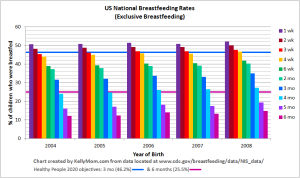
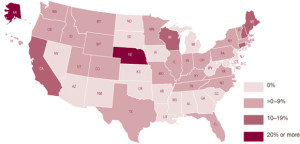
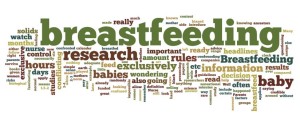
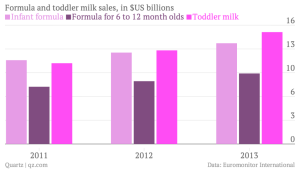
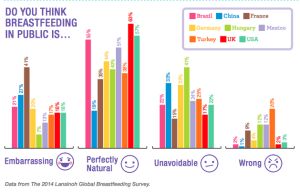
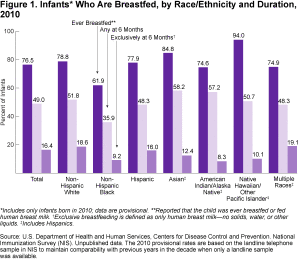
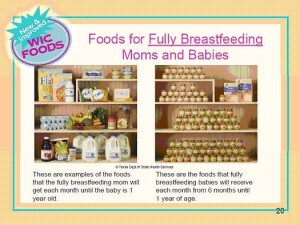
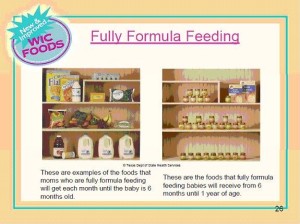
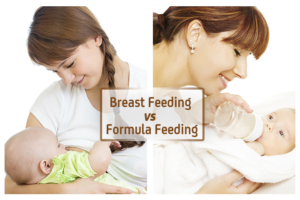

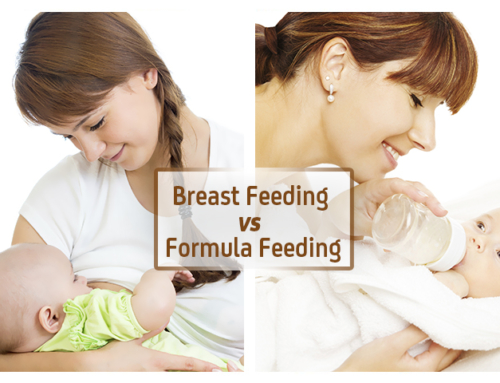

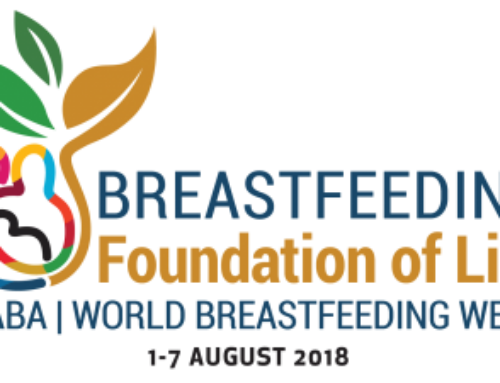
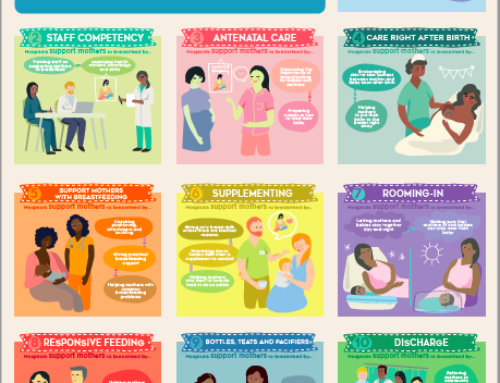
“Pardon me while I bang my head against the wall.” Just about sums it up.
There is nothing new in this, just the same-old Patriarchal split of woman from her own body, woman from her own child, and child from its own source. Post-Postmodern transhumanism is all about industrial profit and silencing of biology – on so many fronts – and it needs to be stopped, not colluded in.
In other words, excellent article. Thank you!
Thank you. I needed a good rebuttal. I knew the research and statements cited in the original piece was wonky but didn’t know how to refute.
Fantastic article. So many wonderful points! I am sharing like crazy.
Dear god, you are so completely out of touch with the reality of working life. I don’t breastfeed because it’s harder to do with three kids and two jobs. Give me a freaking break. I don’t need anybody like you or anyone else telling me my kids are ruined because of that. It’s ridiculous.
Oh God. Please tell me exactly where I said your child would be ruined. As I said, formula feed because you want to, not because a broken system forced you to. Did you want to? Then wonderful you had a choice!
Scientist points out breastmilk is still better nutrition than formula, formula user gets angry.
Of all the things that happen in the infant feeding conversation, this is the exchange that most befuddles and fascinates me. Why are moms so angry about this particular thing? How did infant feeding become one of the main flash points in parenting? It seems almost impossible to consider the implications of infant feeding choices and policies without making mothers angry.
It’s such a sore spot for so many mothers (not all, but enough that it concerns me). I think breastfeeders are angry because they feel defensive. That makes sense, breastfeeders fight an enormous uphill battle just to establish biologically normal breastfeeding habits as our species has done for millennia. We’re in the minority.
But how did we get to a place where formula feeding mothers feel just as angry, defensive, and judged when what they are doing is what the majority of people do, and the vast majority of infant feeding policies support those choices? It’s confounding.
It pains me most that moms feel so defeated when they don’t get to breastfeed like they wanted. Parenthood is full of failure. In fact, breastfeeding problems are a normal part of breastfeeding. Breastfeeding failure should not be such a nightmarish experience, especially not in a society where they are so common.
BTW (correct me if I’m wrong), but I think the author was getting her PhD while she had her baby. So she might have some personal experience with working while child-rearing. It’s possible she simply has a different perspective.
I’m a working a mom of 2 and it is extremely difficult to be able to find the time to breastfeed and work full time but I don’t see this article as telling me that my kids will be ruined if I don’t breastfeed. I’m sure that if we had a system in place that allowed for breastfeeding to be easier and prepared us better, things would be easier for all, including working moms. I agree with the below comment also, breastfeeding was harder than childbirth but had the system prepared me the way it prepares women for labor, it might have been a different story.
Number one I’m not sure you actually read this article because no where did it say that using formula would ruin your children.
Second, your difficulties are exactly what this IS about. Maybe if you were given adequate paid time off from work, you would have one less thing to worry about and could focus on building a breastfeeding relationship. Fighting for working women’s rights is a huge part of what “lactivists” do.
And third as a working mother of two I know how difficult it is. I have had my fair share of quitting thoughts, but I pushed through the difficulties, I’ve ignored the well-intentioned advice of others to give up and found a way to keep going. I know each mother’s situation is different and I don’t pretend to know yours, but I believe articles like this help shed light on why many mothers don’t continue to breastfeed and that we can do better as a society to fix that. I mean absolutely no disrespect but based on your comment, you were the target audience for this article.
She did mention the importance of paid family leave. I would say that puts her pretty squarely in your corner.
Sadly no. One can mention it without acknowledging the people fighting for it are those she’s speaking out against. A little contradictory eh?
[…] other blogs: “Overselling Breast-Feeding” Misses the Mark; Promotion without Support: A Reply to Editorials that Attack Breastfeeding Advocacy; The Anatomy […]
I was so relieved when I read the NYTimes article because of how endlessly shamed I was about not breastfeeding 24/7. Breastfeeding was more painful than childbirth for me by many orders of magnitude that no one prepared me for. No La Leche person did anything other than make me feel inadequate. Her article isn’t about facts and figures but the CULTURE of shaming, demoralizing and Infantalizing grown women by supposedly “do-gooder” breastfeeding champions.
You admit we live in a culture that didn’t prepare you – the type of culture that needs to be changed, that lactivists are fighting to change. I don’t know what happened in you LLL to make you feel shamed, but I’m sorry that happened. That doesn’t mean we gave a culture that systematically shames formula moms. In fact, all data and evidence suggests the opposite. We have a culture that shames and fails breastfeeding mothers – the minority – and that fails women in general. As it failed you.
I also don’t think she’d appreciate knowing you think her piece isn’t about facts. I’m pretty sure she intended facts to be a part of it. She just failed at that part.
I don’t want to argue but I do think that it is important for both sides to respect the experience of others. I believe in breastfeeding and breastfed both of my children. I never experienced any issues in public or with “formula” parents who were derisive or negative about my choices but experienced shaming and intense pressure from lactation consultants and other mothers who were extremely “committed” to the breastfeeding cause. This was true for many of my friends as well. Every family is different. Every mother is different. Every child is different. To negate the experiences of the working moms who have commented is to be as offensive as the people who denigrate women who choose to breastfeed. Lobbying for structural change to support breastfeeding and supporting the individual choices of mothers are not mutually exclusive goals. The goal should be to support mothers and babies in a comprehensive manner.
How was my comment negating her experience? I ask honestly because that was not at all what the intent was.
I am with you on just about everything but donor milk. I don’t think there is enough evidence to show that donor milk will have the same effect on illnesses like ear infections and respiratory tract infections that mother’s own milk does. There is evidence that donor milk reduces the incidence of necrotizing enterocolitis in preterm infants, but that is a function of gut health, not opportunistic infection. There is no biofeedback of disease exposure nor age and growth specific needs with donor milk. In cases where the milk is shipped over great distances, the donor is not living in the same environment as the infant and does not have the same exposure to pathogens and allergens that the mother would. While donor milk can be life-saving for preterm and helpful to mothers with actual physical problems such as mastectomy or PCOS, donor milk sought by perfectly healthy mothers who are too busy to breastfeed is exploitative.
So you don’t believe it should be normalized so that we can study it? Or even have it as an option for families who WANT it, regardless of the health reasons?
‘That women with bottles frequently hide at home, afraid of the backlash of a vicious majority.’
I discovered that I was unable to produce more than 50ml of milk at a time when my baby kept loosing weight. I have to use formula. Although there is no ‘backlash from a vicious majority’ I do usually plan my day so that formula feeds are done at home, not in public. I do ‘frequently hide at home’. It’s a more subtle process that makes me feel this way and it’s to do with the way that breastfeeding is promoted. I feel inferior to the other mums.
Can I ask why you feel inferior? What is it about how breastfeeding is promoted that you believe affects your thought process?
Also, you should talk to many breastfeeding moms – most will supplement or bring bottles to avoid nursing in public because of the backlash.
I can attest to what you just said. I was fortunate enough to overcome breastfeeding challenges and nurse my baby exclusively for first 12 months of his life. Both my hubby and I am very satisfied with our choice. However, my hubby and I felt embarrassed every time I latched my baby in public from fear of exposure of my nipple/breast/judgement-from-others simply because it’s not the norm. It is natural that one feels more defensive about doing anything that varies from the mainstream. At 12 months I started him on cow’s milk. Now when I’m in public and I feed him milk in a sippy cup I feel more relaxed and not intensely aware of people judging me. I wish I saw more breastfeeding moms in public so I felt like I fit-in. I went to a 1 year old’s birthday party where there were lots of moms and babies, and I was the *only* one pulling up my shirt to latch my baby whenever he needed to nurse for comfort or nutrition. I was acutely aware of the “stares” and couldn’t relax.
Nice summary, plus I like the “Abso-freakin-lutely”! Find my much drier 🙁 take on it at the Academy of Breastfeeding Medicine blog: “Promotion without Support.”
As an aside, I am thinking these articles are timed by the media to coincide with high times of media presence from the ABM, b/c I seem to notice them coming out whenever there is a new study or a meeting. Would love your thoughts on that one.
I loved your take!! The more responses, the better 🙂
I do think there is a timing to this which is infuriating, though I don’t know how much of it is intentional versus the new study/meeting elicits the defensiveness/anger/whatever that triggers the writing. Know what I mean?
Your article was really good, well-researched and well-laid out. The truth is, though, that any shaming I felt in my breastfeeding times has always come from lactivists and those heavily invested in the “breastfeeding world.” I wish it hadn’t been so, but that has been my experience, When my first child was born, I was blindsided by how hard everything was. I had no idea nursing could hurt so bad, and then I just thought that the severe damage that was inflicted on my nipples was somehow normal because no one ever said it wasn’t and most of the information I found online at the time just talked about latching-on pain and not actual nipple damage. I thought I just had to grit my teeth and get on with it. When I finally went to go see a lactation consultant a week and a half later when I realized that crying every time I had to latch her on and delaying feelings as long as I could because of the pain wasn’t normal, the consultant got mad at me for waiting so long. She then proceeded to tell me that I should not be nursing with a pillow, and that the football hold was not a good way to do it because what was I going to do when the baby grew too long to do it that way? She didn’t even check for proper latch. She gave me a prescription for nipple ointment with strict instructions to use it for only five days or it could cause skin thinning (untrue… The ointment won’t cause thinning that quickly). She minimized my excruciating pain and didn’t check on my mental state. In the end, I ended up pumping and bottle feeding for 7 months (I didn’t need to top up more than maybe an ounce or two a day with formula), and the whole time I was filled with sadness and shame and regret. Actually, those negative feelings lasted for years even though, and maybe because, I was able to breastfeed baby number two with no problems whatsoever. It wasn’t until baby number three came along and I had the same kinds of issues, that my angst was resolved from baby number one. I knew I could nurse because of number 2, and I was older and more experienced, and more knowledgable about how to find information on the Internet. I found out he had a lip tie and tongue tie, and learned, by looking in my daughter’s mouth, that she had them too. I had baby number 3’s ties snipped. I met with a lactation consultant who restored my faith in lactation consulting somewhat, though she minimized the pain of my deeply fissured nipples too. Do you know how helpful it would have been to have an LC say, “Yeah, your nipples look extremely freaky and painful and that really, really sucks big time. It’s hard.” Despite getting the ties snipped, I actually had to pump for about four weeks with baby number three before my nipples healed, and I did so against the advice of the lactation consultant, who thought I should just keep nursing, and also against the advice of my doctor, who thought my nipples wouldn’t heal unless I left them severely alone. In the end, I nursed number 3 successfully for about 13.5 months. So I’ve found a pretty big lack of empathy in LC circles. It seems to me that often breastfeeding is pushed at the cost of a mother’s peace of mind. With baby number three, and baby number four, who was born 7 weeks early and weighed less than 3 lbs, I knew what I wanted and I knew how to advocate for myself. (Baby number 4 is 15 months and I am still nursing him).
The other thing that personally drives me nuts about stuff I read on lactivist sites is that I’m made to feel stupid or backward or repressed if I’m uncomfortable with nursing in public. I was fine with nursing 3 and 4 in public if I needed to, but I was happier doing it in private if I could. I’ve never been able to latch my babies on quickly, especially when they were really young, and they’ve all been squirmy, twisting their heads around and pulling off to look around if they were in an unfamiliar place. I feel like with breastfeeding, you’re made to feel like you HAVE to be comfortable doing it everywhere and anywhere, and you have to be in people’s faces about it, because if you’re not, then you’re not advocating for breastfeeding enough. That pressure is there. Don’t get me wrong, I don’t think nursing is something that should be done behind closed doors, but if a woman is shy or uncertain of herself, it is supremely unhelpful to tell her she shouldn’t be, and that she is somehow failing at breastfeeding if she is.
So what is the main point of my long and rambling reply? (Sorry for the length and ramblingness)… It’s that I absolutely believe that breastfeeding is the way to go if at all possible, but that the lactivist world really does need to work on how they present their message. It was a shock to me how difficult breastfeeding was, and then a real blow to my fragile post-partum emotional state to be told that yes it was hard, but I should just suck it up and nurse through the pain. In fact, I went on to nurse my other babies after my experience with number one in spite of my experiences with the lactivist world, because despite the in-your-face extremist tone they had, I did (and do) believe that breastfeeding is the best option. Any support that I’ve found has been through my own hard work, and any solutions in the end were figured out mostly by myself. And there is shockingly little information that I’ve been able to find out there on really serious nipple damage. Seriously, it took until number 3 was 16 (!!) weeks old for my nipples to heal, and the one nipple was a little tender throughout the whole time I nursed him. No one talks about that kind of stuff. Hmm, maybe I should train to be an LC, lol.
I wonder if pure, unprocessed Shea butter would help mom’s with nipple damage. I’m not talking about lotions with Shea butter added but 100% unprocessed Shea butter, which has a harder paste consistency in its natural state but immediately emulsifies once it touches warm skin and absorbs quickly even though it goes on slightly oily.
The reason I suggest it is because it can be eaten so an infant would not mind the taste compared to some prescription ointment which probably tastes nasty. It has great moisturizing and healing qualities and I use it all the time on cuts and dry skin. The stuff cured my excema when nothing prescribed would and I use it as a face moisturizer as well. It is less oily than coconut butter and absorbs better.
It is really hard to find in retail drug stores and beauty stores, and if you do find it there, it tends to be processed, which reduces the healing benefits. What you want is a product that has an off-white or bright gold color, not pure white (the yellow doesn’t stain). I get mine on amazon or eBay and a decent price can be from $5-$12 for a pint and lasts forever as a little goes a long way. It comes from a nut tree in Ghana and some other african countries so is usually called “pure African Shea butter”. If you live somewhere that has African stores, you can usually find it there as well.
This article is amazing! Seriously after every paragraph, I wanted to fist pump and yell “Yeah!! Right on!!”
You should submit it to the Philly Inquirer. Or similar.
Thank you. Now I’ll be able to sleep at night. My blood pressure rose precipitously after I read the NYT opinion. Would love to send Jung the recent studies suggesting that lactation is necessary to “reset” the mother’s body following pregnancy – to avoid the increased risk of heart disease and diabetes brought about by pregnancy without lactation. Also, the emerging work on breastfeeding and the micro-biome. Jung’s diatribe was definitely “opinion”, having very little to do with fact.
So tired of the pushback…
Really interesting article. The only thing I am not comfortable with is donor milk. While it sounds heroic and worthy of praise like donating blood or something it strikes me as a possible way to exploit poor women some more. I don’t have anything against it per se, I would donate milk or even nurse another woman’s baby in the case of an emergency. But it is too easy to see how this could turn out to be a profitable enterprise – that is, profitable for everyone but the donor. Privileged parents buying the milk of healthy, rosy cheeked and closely monitored third world women? And some Silicon Valley designed fancy app pocketing the profits? It gives me the willies. While I agree that there shoud be donor milk available for those who need it, I think we should be wary about somebody making a business out of it. Wet nursing in order to make a living? I don’t know…
Thank you for restoring my faith in people who are supposed to be smarter than me! I can stop banging my head against the wall now.
Btw; that whole “shaming” thing?,…. maybe these women wouldn’t be blaming others for their own guilt if they were more confident and secure in the choices they’ve made?….. just sayin 😉
Oops did you forget that you are supposed to be toeing the new line and saying that you people don’t shame women…anymore? Did you forget that your new argument is that you don’t troll women who have to make hard decisions about how to feed their babies? Now that women are sick of your telling, that is. You realize that you just said that maybe women wouldn’t feel shamed, if what they were doing weren’t so shameful? Back to the Lactavista Revised Talking Points meeting with you.
[…] Geen Zondags Leesvoer zonder borstvoeding en daarvoor grijp ik toch weer naar Evolutionary Parenting. Het gaat, opnieuw, over de noodzaak die sommigen voelen om ‘borstvoedingsfanaten” in de strafhoek te zetten. Are we “overselling” breastfeeding? Are advocates trying to force women to breastfeed? “Overselling Breast-Feeding” Misses the Mark | Evolutionary Parenting | Where History And Scienc… […]
I live in the UK where there is poorly paid but long statutory maternity leave up to 52 weeks (the last 13 weeks unpaid). Still the media is also publishing from time to time articles that try to demistify the benefits of breastfeeding and warn against the terrifying breastfeeding lobby. And I, like the author, just want to bang my head against the wall. This is a very good article and really resonates with my thinking on this issue. Mothers who breastfeed their babies past 6 weeks, let alone 6 months are so few in this country that they can’t really shame anyone. There aren’t enough numbers to shame all the women who claim have been shamed for not breastfeeding. I think we all feel very vulnerable and are sensitive to other people’s comments and opinions especially right after giving birth, and end up feeling ashamed about pretty much every parental choice we make or cannot make. It’s not only formula feeding mums feel who feel this way, it’s how we all feel. It’s very frustrating to see how this issue has been turned into a battle among women rather than a battle for women and more importantly, children.
Thank you for another well expressed article.
I am so happy that I left the US and have had my child in NZ where not only the prenatal class we went to (we did pay for them) but the midwives I dealt with (three in total, due to a family emergency for my main one), and the staff we dealt with briefly at the hospital and for several days at the maternity unit (government paid, thank you taxes!) ALL were on board with my desire to breastfeed. I had paid time off, am on extended leave from work for this first year, and we were able to buy a house just before the baby and can still live reasonably. Compared to what we’d be able to do in the states…I have found my experience entirely magical and am grateful for it each time I feed my daughter (which is a lot, babies are hungry, breastfeeding takes time!).
I’m not sure if the NZ situation is due to more intelligent policy makers or the more conservative idea of women’s roles in society, but it’s working in my favor and is the single biggest reason I have no inclination to return to the US to live. I find it a bit ridiculous that a country with the same population as my home state is doing so much better, it certainly shows the disparity of how NZ and the US spend the tax money they collect.
I heard the interview with Jung on CBC radio, I became so upset by her diatribe against breastfeeding that I had a hard time relaxing afterward. I had my first child in 1964, in Ontario, No one in the hospital was breastfeeding. No one I knew breastfed their baby at that time. I do remember a neighbour who breastfed her baby when I was 13 and what I remember about that was all the fun that was made of her behind her back. Why did I breastfeed? I hated seeing a baby with a bottle propped in a crib all alone. I thought that unless I was breastfeeding I would be tempted to do the same thing when I was busy, and refused to allow it. Also my Mum told me that my Dad was disappointed that she couldn’t breastfeed. I think that also influenced me, I wanted to do what my Dad thought was a good thing. I was very lucky, I did not have major problems during the feeding of my five children. Had I had severe problems would I have continued? I’m not sure, but it was good for me, it was very good for our budget, and I became an advocate for breastfeeding, buying helpful books for first time Mums. It’s easy to become zealous when you think what you are doing is good for the baby and the mother’ but overtime you learn to be more gentle and understanding. We all make mistakes but don’t throw the baby out with the bath water. Women should have a choice and have that choice supported.
All three of my daughters and my daughter in law breast fed their children. Of course I was happy but would certainly respect whatever decision they made that was best for them and their baby. On of my daughter is a Lactation Consultant and before that volunteered at the LLL and she always said she was taught by the LLL that it was all about choices and respecting what women wanted and were able to do. I have a lot more to say but this will suffice.
Do you know that the university of toronto is in Canada and not the USA?
Seeing as I was born and raised in Toronto, yes I am well aware. (I also worked at the university of Toronto for a couple years.)
I am not aware what that has to do with anything in this piece though.
A lot of your counterpoint is US-centric, which struck me as odd, given that you are critiquing a university of toronto prof….
I breastfed all three of children, including twins, for two years – exclusively for more than six months. This was in the 80s, when it was uncommon to breast feed. I routinely breastfed wherever I was, including church, concerts, in the park, wherever. Never an issue. I just covered up with a small blanket or just used my pulled-up shirt to cover the baby.Nobody appeared to know, and if they did, nothing was ever said. Breastfeeding is really no big deal. It might take a few days to learn, but after that it’s a piece of cake if you don’t have to go to work everyday. Even then, it’s manageable. And the milk is free and available as needed, prewarmed and sterile. The rewards are so great, it should just be regarded as a given. I.e,: Of course you breastfeed, just like of course you eat healthy food when you’re pregnant. It’s healthier for the mother, and the baby. Breast milk has evolved for many, many centuries. To even consider that formula can replace the health benefits – not to mention the human closeness and emotional connection it fosters between mother and child – is false advertising. I loved breast feeding and I absolutely think it is proper for it to be encouraged and supported in every way. Our government should grant extended maternity leave and help mothers have all they need to be successful at breast feeding.
[…] the breastfeeding advocacy community. There were dozens of response pieces, my favorite being this one, which really tears this piece […]
Honestly it makes me want to bang my head against a wall when people take a person’s nuanced argument and reduce it so that they can place that person squarely into one of two camps on an issue.
I read Jung’s opinion piece and listened to an interview with her on KERA Think, but haven’t (and probably won’t) read her book. Your rebuttal seems well-supported with research, but each individual fact is not properly cited, and thus your article would be very much subject to be picked apart as well. I imagine Jung’s book provides ample citations, as I’m sure your book on the rebuttal, if you were to write one, would too. But alas you and Jung are both limited by the medium in which you deliver your message (although this being your website, you are arguably less so). Still, I think your rebuttal misses the mark itself, as do many reader responding so angrily to this op-ed, by pigeon-holing Jung into the lump category of the anti-breastfeeding “brigade”. I mean, I don’t think you can fairly dump her into the anti-breastfeeding camp when she says that she herself breastfed, with pleasure (because it happened to come easily for her), and when she says towards the end of her piece: “Does all this mean that women should stop breast-feeding? No. If you want to, if it’s easy for you, if you are healthy, if your baby is thriving on breast milk, if it’s important to you, then by all means do it. If I had to do it all over again, I probably would. But it would be different. Even though I might breast-feed as a way to nourish my baby, I could no longer use it as a talisman to ward off evil and disease. It’s a perfectly good choice, but it’s not the only choice, and it may not always be the better choice.”
Jung’s article and your rebuttal tell me that the two of you share similar points of view on two of the more important issues. You both agree that how one feeds her baby should be a choice. You both agree that US public policies suck when it comes to actually supporting breastfeeding mothers.
You make some good points about WIC and the inherent financial limits influencing public policy decisions. But you cite no evidence that financial limits were the basis for the difference between the WIC food packages for breastfeeding and formula-fed babies, let alone the exclusive basis. I’m not saying it doesn’t exist, but I do not see your source. I did look at the Texas WIC program’s website, from which you took the pictures comparing breastfeeding and formula fed WIC food programs, but they certainly don’t indicate that costs played a role in the program differences. Instead, it’s worth comparing how they summarize the difference in packages:
For the exclusive breast-feeding package:
“Exclusively breastfeeding (feeding your baby only breastmilk) is the healthiest choice for you and your baby and this package gives you the most food. You will receive breastfeeding support throughout your baby’s first year. The American Academy of Pediatrics recommends mothers exclusively breastfeed for the first six months.”
For the formula-fed package:
“This is the smallest food package for moms and babies. This package includes more formula than the mostly breastfeeding package, but not all the formula your baby may need. The amount of formula will vary depending on the age of your baby. Babies receive this package until their first birthday, and moms receive this package until their babies are six months old.
You can also choose to feed your baby only or mostly formula with some breastfeeding. The amount of formula provided by WIC may not be enough to meet the nutritional needs of your baby, so you should breastfeed any time you and your baby are together so you won’t have to buy more formula.
If you choose this package, your baby will receive the following foods throughout his or her first year. You will receive foods for yourself only during the first six months.
As a WIC mom, you will receive breastfeeding support.”
There may be underlying financial reasons for the difference, but if so, they certainly did not explain them in the above. I read the message of the two preambles to quite clearly be, “you should breastfeed, and if you do, we’ll reward you with more food, and if you don’t, you’ll still get food for your baby but less than you would if you breastfed and possibly not as much as you need.” Surely one sees how patronizing this is, unless one tends to be utterly removed from the demographic that would receive WIC support.
I am also surprised that you would so adamantly dismiss the notion that there are pro-breastfeeding organizations out there shaming or over-pressuring women to breastfeed, Or to say that militant lactivists are a tiny minority – to say such things tells me you are either not listening or you are listening but not hearing the endless women in forums, reader comments, and first-hand who have had some sort of negative experience with judgmental lactation consultants, mothers, mother-in-laws, or other breastfeeding bystanders. First, just because LLL’s mission statement, or whatever, is supportive of choice, does not mean that all those thousands of volunteer women adhere strictly to such a mission statement and offer unfailing support to new mothers, whatever their infant-feeding choice. Furthermore, how do we even know that women’s “personal breastfeeding goals” are self-defined, if one of the main issues here is whether or not women feel an unreasonable amount of pressure to breastfeed? If the CDC says 60% of American women are not reaching their breastfeeding goals, that does not lead me to only the conclusion that women’s choices to breastfeed are not adequately supported (although I would conclude this). It also makes me want to know how the breastfeeding goals of women are being set, and by whom.
To write a rebuttal that seems, to me, to overlook the very real impact of woman-on-woman, mom-on-mom, and society-on-woman shaming and pressure is tone deaf and dismissive of women’s personal experiences. As with any movement, breastfeeding has, of course, been co-opted by many and filamented into a myriad of disparate agendas. Your agenda sounds fine…I know that not to be the case with just any lactivist, just as I know that not to be the case with anyone who espouses an agenda of any kind. That’s the tough part of aligning yourself with any camp. I try to eat and grow organic food but that doesn’t mean I want everyone else who is “pro-organic” to be my representative.
I’m pregnant with my first, and fingers crossed breastfeeding will come easily for me. But I have also been introduced in these 7 months of pregnancy to an alarming world of mother shaming mother – it is not just men inflicting patriarchy on women, pregnant women, and mothers! Luckily I think my sense of self is strong enough that I will be able to shrug off most of these pressures, but they fascinate me and make me really angry. Any kind of sanctimoniousness about parenting choices like breastfeeding, sleep training, attachment parenting, etc etc – it’s all just another form of patriarchy.
As an example, why has it been hammered into my head that not only can I not drink a glass of wine here and there during my pregnancy, but that I should not have one sip, nada, nothing of alcohol? The reason is patriarchal in nature: there are some vaguely understood risks from moderate to high levels of alcohol consumption during pregnancy, and there is a perceived need to get this information through to 100% of women, whether they are well-adjusted, educated women without any sort of drinking problem or are severe alcoholics. Thus the message becomes simplified, condensed into a blanket statement like “the safest course of action is to just not drink at all during any point in pregnancy”. Instead of being able to evaluate the nuances of this poorly understood issue, we all get the same base message shoved down our throats because women as a whole are not regarded as competent enough to make their own evaluative decisions. That is patriarchy, my friends.
Likewise, it seems that while breastfeeding is ideal for mother and baby, that premise is too often based on the benefits of breastfeeding in a vacuum scenario, without the gazillion problems and complications that could arise during the effort. You have cited figures showing that the U.S. is still not there, in regards to a goal percentage of women who breastfeed. But that doesn’t mean we can’t have a conversation about how the breastfeeding message may be overshot. First of all, the people reading this website, the NYT op-ed, Jung’s book, or listening to an interview with her…well I’d be willing to bet my house that’s precisely the demographic of people who already know that “breast is best.” But that position can be simultaneously correct and still poorly administered to the public at large.
I hope that there are people out there who continue to push for workplace support of breastfeeding, for normalizing this natural process in public. But simultaneously I would not wish upon any new mother any additional, socially-imposed pressure or shame. If I try and fail at breastfeeding, I absolutely REFUSE to beat myself up about it. Because, frankly, f— that.
The absolute worst shamer in my mom life was a family member who attempted breastfeeding with her oldest, but stopped around 6 weeks due to a frightening lack of education and support. She exclusively formula fed her youngest from day one. Here is a brief synopsis of the things she told me:
– Some women naturally have “bad milk” and if my baby wanted to nurse more than every 3-4 hours, I probably had it and needed to use formula.
– Because I was over 35 when I delivered, I was more likely to have “bad milk” or an insufficient milk supply.
– Cluster feeding was abnormal and proved that I needed formula.
– Holding babies would spoil them and teach them how to manipulate adults.
– I would be “forced” to use formula when I returned to work so I was better off quitting breastfeeding before maternity leave was over.
– Breastmilk is only nutritious for 3/6/9/12 months, or whatever milestone we had just passed.
– Babies are supposed to be fully weaned by 12 months. That is what “doctors” recommend.
– Breastfeeding made babies clingy and over-depended.
– “Extended” breastfeeding was dangerous to a mother’s health.
– Bottle feeding was “necessary” for family members to bond with the baby.
– There is no such thing as self-weaning – a baby will never give up breastfeeding on his/her own. It is impossible.
– The older a baby is when weaned, the more cavities s/he will have.
– Breastfed babies are all picky eaters.
Did I mention that I heard ever single one of these things before my baby was 10 days old? And that is by no means a complete list…
In fact the only “positive” thing this relative ever said about breastfeeding was when my baby was 14 months old and she made the off-hand comment at brunch that all moms ought to do “extended breastfeeding” so they could eat whatever they wanted and lose weight, and that if she had not had “bad milk” she would be thin like me. My response – anyone mind if I finish the last two pieces of quiche? And – please pass the peanut butter. And – are you going to finish that?
[…] Welke moeder of vader herkent dit niet: je sluit jezelf buiten terwijl je peuter binnen zit. Of vergelijkbare rampen. Je bent niet de enige, niet de eerste en vast ook niet de laatste. Heel Gezonde Mama: Paniek! Hoewel ik het lang niet altijd met haar eens ben is Liesbeth toch een van mijn favoriete bloggers. Ze zet de lezer aan het denken over het zo maar klakkeloos aannemen van alles wat op een scherm of op papier staat geschreven. Foodblog van Liesbeth Oerlemans: alles over voeding: 100% suikervrij: een recensie hoe we alles als zoete koek slikken Dit bericht past natuurlijk beter op mijn persoonlijke blog, maar het sluit zo mooi aan op het vorige. De auteur Inostratos is iemand met zo’n vierjarige beroepsopleiding diëtiek waar Liesbeth het over heeft en ze combineert haar grote kennis over voedsel en voedselbereiding met haar liefde voor filosofie en archeologie. En ik ken haar dan ook nog van ons gezamenlijke verleden in de vrijwillige borstvoeding begeleiding toen we allebei in de kleine kinderen zaten.Glutenvrij zuurdesembrood met haver en mais | da’s andere koek En ook een mooi plaatje om naar te kijken. Als je met kinderen wandelt, kun je van hen leren hoe je bbijzondere dingen als deze opmerkt. Voorwaarde is dat je je tempo terug schroeft naar dat van hen en dat je je ogen instelt op de modus ”verwondering’. Bekijk deze afbeelding vooral ook op groot formaat! Bubbles | Natuurfreak Geen Zondags Leesvoer zonder borstvoeding en daarvoor grijp ik toch weer naar Evolutionary Parenting. Het gaat, opnieuw, over de noodzaak die sommigen voelen om ‘borstvoedingsfanaten” in de strafhoek te zetten. Are we “overselling” breastfeeding? Are advocates trying to force women to breastfeed? “Overselling Breast-Feeding” Misses the Mark | Evolutionary Parenting | Where History And Scienc… […]